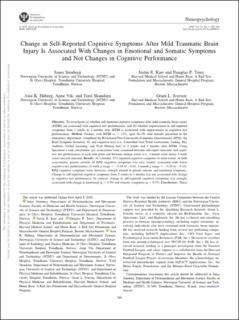| dc.description.abstract | Objective: To investigate (a) whether self-reported cognitive symptoms after mild traumatic brain injury (MTBI) are associated with cognitive test performances, and (b) whether improvement in self-reported symptoms from 2 weeks to 3 months after MTBI is associated with improvement in cognitive test performances. Method: Patients with MTBI (n = 135), aged 16–59, who initially presented to the emergency department, completed the Rivermead Post Concussion Symptoms Questionnaire (RPQ), the Brief Symptom Inventory 18, and cognitive tests (i.e., Controlled Oral Word Association, Coding, Rey Auditory Verbal Learning, and Trail Making test) at 2 weeks and 3 months after MTBI. Using Spearman’s rank correlations (ρ), associations were examined between self-report measures and cognitive test performances at each time point and between change scores (i.e., 3-month score minus 2-week score) on each outcome. Results: At 3 months, 27% reported cognitive symptoms to some extent. At both assessments, greater severity of RPQ cognitive symptoms was very weakly associated with worse cognitive test performances (2-week ρ range = −0.19 to −0.01; 3-month ρ range = −0.20 to −0.10). RPQ cognitive symptoms were, however, strongly related to greater somatic and emotional symptoms. Change in self-reported cognitive symptoms from 2 weeks to 3 months was not associated with change in cognitive test performance. In contrast, change in self-reported cognitive symptoms was strongly associated with change in emotional (ρ = 0.58) and somatic symptoms (ρ = 0.57). Conclusions: These findings indicate that improvements in subjective cognitive symptoms after MTBI co-occur with improvements on other subjective metrics, but are not related to improvements in objectively measured cognitive functioning. | en_US |
